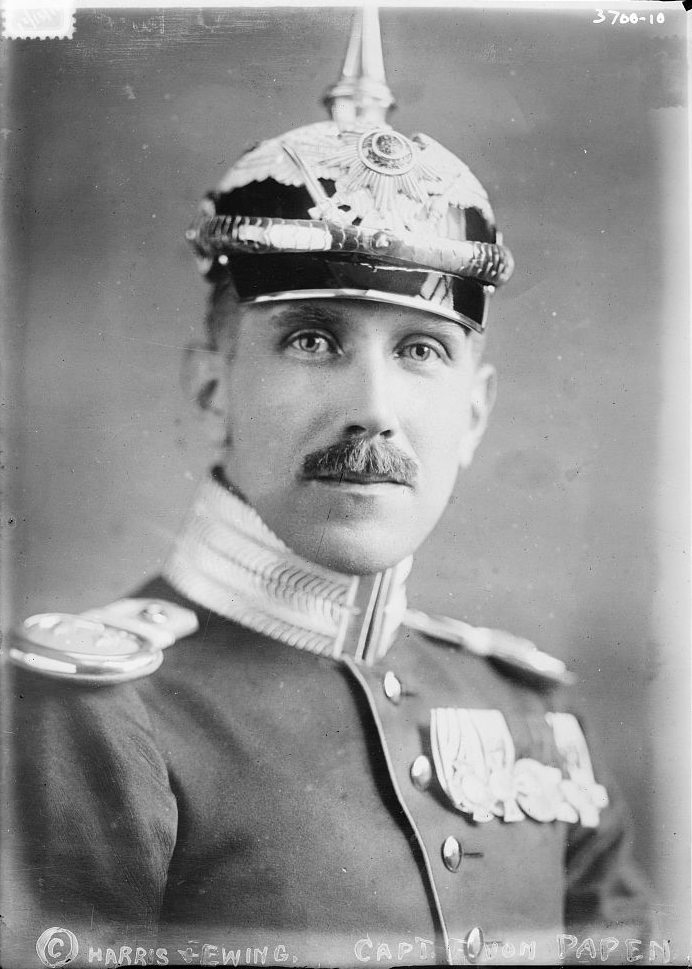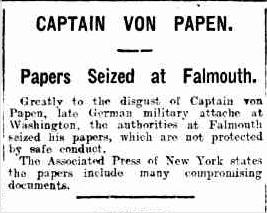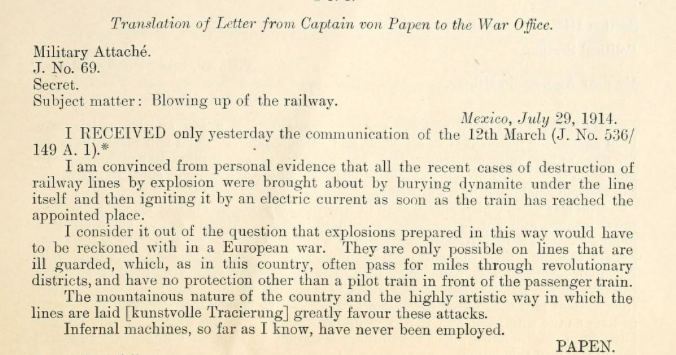During World War One there was an extensive IED sabotage campaign run by German agents and diplomats in North America. I have written in previous posts about some of these bombing incidents. See:
http://www.standingwellback.com/home/2012/1/22/massive-explosion-in-new-jersey.html
http://www.standingwellback.com/home/2012/1/17/new-yorks-ied-task-force-1905-1919.html
http://www.standingwellback.com/home/2013/9/17/kurt-jahnke-the-legendary-german-saboteur.html
One of the protagonists, or “players” in this great game was a young aristocratic German military officer, serving as diplomat on the staff of the German Embassy in Washington., His name was Kapitan Franz von Papen.

Von Papen in 1914 (public domain)
Von Papen was a man who clearly enjoyed intrigue. As well has involvement in the German sabotage campaign in 1915, he was also involved in discussions as an intermediary to Irish revolutionaries looking for a supply weapons for the Easter rising of 1916, and was involved in liaison with Indian nationalists as part of the Hindu German Conspiracy. In December 1915 he was declared “persona non grata” by the US government because of alleged complicity on the Vanceboro Bridge bombing . Travel home to Germany was challenging, but Von Papen received a diplomatic document, a Laissaiz Passer, meaning he travelled via Falmouth in England knowing he could not be detained by the British under diplomatic law. To his horror the laissez passer did not cover his luggage and in front of him on the dockside at Falmouth the British officials opened his bags finding code books and incriminating documents.

Documents were found which detailed the payment of over $3Million to the German agents involved in the sabotage campaign. Transcripts of the seized documents are available here and make fascinating reading. His cheque stubs were annotated with significant detail such as “for the purchase of picric acid” “for dum-dum investigation” and exposed several agents who lived in England but were offering services to the Germans. Of note is the Germany authorities in Berlin asking him to find out details of how Mexican revolutionaries were blowing up trains in 1914, “in order to form an opinion whether, in the event of a European war, explosions of this kind would have to be reckoned with”.

One can imagine the apoplectic Prussian officer watching as the British officials simply opened his bags and took the documents out. Further documents linking Von Papen to the Bombing Campaign in the US were discovered in a Wall Street office he rented. Other documents incriminated the Austria Ambassador who was collecting munition shipping data for the Germans. One might have thought that Von Papen would have learned his lesson. But no…. In a later parallel, while serving with the Ottoman Army in Palestine the following year, he left behind a suitcase in a room he was using in Nazareth as the British advanced. In it, papers were found belonging to him incriminated several agents he was running locally. All in all then, Von Papen’s spy-craft was pretty shoddy.
In 1916, an US indictment was issued against him for plotting to blow up Canada’s Welland Canal, based on the seized documents from Falmouth. He remained under indictment as he rose in the ranks of the German inter-war political scene, becoming Chancellor of Germany in 1932, at which point the US charges were rescinded. There is this rather nice quote about Von Papen at the time by the French Ambassador “His appointment to Chancellor of Germany was met by incredulity. He enjoyed the peculiarity of being taken seriously by neither his friends nor his enemies. He was reputed to be superficial, blundering, untrue, ambitious, vain, crafty and an intriguer.” He was subsequently easily out-manouvered by the Nazis. He was then made Ambassador to Austria, in the run up the the Anschluss.
In 1939 he was appointed as Ambassador to Turkey, where the intrigue of the war years suited his inclinations, if not his expertise. The Turks initially objected pointing out that his previous diplomatic activity had involved sabotage in the US and subversion in another (Austria). but he was appointed. In 1942 a peculiar incident occurred, an act of intrigue against the man with so much experience of it himself. There are conflicting version of this story but it would appear that the most convincing is this:
The Russian intelligence service , the NKVD, decided to assassinate Von Papen. After an abortive attempt to incorporate a Czech officer, they found a Yugoslav born communist, now Turkish, to conduct the mission. The perpetrator was told to shoot Von Papen who regularly strolled along a particular avenue with his wife, then cover their escape by triggering a “smoke bomb”. But with NKVD subterfuge the smoke bomb wasn’t a smoke bomb at all, but contained a large amount of high explosive. The perpetrator fired one shot at Von Papen, which missed then immediately triggered the smoke bomb’ which exploded blowing the shooter to pieces. His penis was found in a tree and a distinctive wart on the skin near an eyebrow was also recovered from the scene. The NKVD had also , allegedly planted documentation in the device packaging suggesting the perpetrators was from the German Embassy itself. Another version suggests that this was “reported” by TASS as disinformation. Then idea was that the assassination would occur and the perpetrator would be blown to bits to reduce the risk of the incident being compromised as an NKVD operation.
Von Papen and his wife survived the attack, shaken but largely unharmed. For what it is worth Von Papen suspected the British. The Russian embassy hinted that the Americans “knew” it was the gestapo who were responsible. The turks arrested the “station chief” of the NKVD (officially listed as an “archivist”) at the Russian embassy . This occurred amongst diplomatic uproar as the Turks surrounded the Russian embassy for two weeks demanding he be handed over. Two other emigre Yugoslav communists (from the Muslim community) were also arrested. These latter two confessed that the Soviets had ordered the assassination. They claimed that the Russians had given the perpetrator, Omer Tokat, a revolver and the supposed smoke bomb. all defendants were found guilty. Things got complicated in subsequent appeals (too complex to explain in a short blog).
After the war Von Papen was convicted at the Nuremberg trials , released in 1949 and died 20 years after that.
